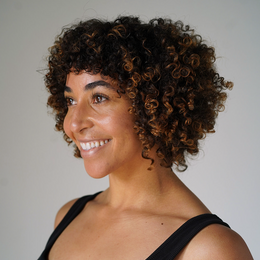Try This Approach To Help Reduce Inflammation and Improve Longevity
A biomedical researcher offers tips on using integrative medicine to reset the body when it comes to inflammation
According to a recent health study, more than 35% of U.S. adults struggle with chronic inflammation, the body's immune response that can affect every part of the body, leading to conditions such as Type 2 diabetes and cardiovascular disease.

Lara Hemeryck, Ph.D. is a biomedical researcher, founder and CEO of Scicomwiz, a science-backed agency that supports thought leaders in proactive health care and functional medicine to effectively deliver their message.
"My gut and my lungs were my weak spots."
Hemeryck struggled with chronic inflammation and alleviated her symptoms through functional medicine, a systems biology–based approach founded by Jeffrey S. Bland, PhD, which focuses on identifying and addressing the root cause of disease.
Inflammation and the Body
Hemeryck struggled with IBS (Irritable Bowel Syndrome) symptoms, rosacea, rashes across her chest as well as unexplained itchy spots. Her face was swollen — particularly on the eyelids — and she suffered from chronic sinusitis, inflammation across the sinuses.
"My gut and my lungs were my weak spots," she said. Additionally, Hemeryck experienced brain fog or general fatigue, which affected her ability to function at 100% and perform daily tasks.
Inflammation differs for everyone, which can breed many approaches to alleviate symptoms. In Hemeryck's case, she tried various approaches from supplements to tests with both general practitioners and specialists.
It wasn't until Hemeryck left the skin and lung specialist's office that she noticed a pattern. No one had looked at her body and its symptoms as a whole, functioning entity. But functional medicine — and its doctors — do.
Understanding Functional Medicine
The first step in understanding functional medicine is that it is science-backed. Food, one of the lifestyle changes listed under the alternative healing modality, is medicine.
"Food moves through the body quickly, meaning you will feel the effects, both good and bad, very quickly," Hemeryck said. "Depending on what you're eating, you can feel [something like] your brain fog disappear in a couple days."
In Western Civilization, functional medicine is a new modality — but not that new. The integrated health approach has been around since 1991. For Hemeryck, her medical field background didn't necessarily mean she was well-versed in all medicinal and healing modalities.
Even with a biomedical science background, she wasn't aware of the concept of functional medicine. "For me, I don't understand how during all of my education [food] didn't come up in the medical field. Like the importance of food. So that was already a massive gap," she said.
Learn More About Functional Medicine
In a digital-first world, there's a lot of misinformation. Hemeryck also noticed how companies struggled to stay abreast of the latest science and strike the gap between marketing and science teams, which means that there is often a mismatch in making content engaging and accurate.
"Science can be boring," she said. "Scientists speak in their own language. But it's so important to get the right information out there. What I see happening in the world is people just get demotivated."
Hemeryck found drinking bone broth, intermittent fasting, removing low-quality oils and eating cruciferous vegetables to be very beneficial for her.
Reading and educating yourself on the topic of functional medicine — before turning to social media – can be a smart way to navigate the subject matter.
If You're Struggling With Inflammation
Talk about it. Trying to navigate and alleviate symptoms can be a frustrating and lonely journey. "We don't have to blame doctors for this. We have to blame the whole system," Hemeryck said. Have an open conversation with your medical doctor, or find a practitioner who takes a whole-body approach when diagnosing symptoms.
Don't believe everything you read. If you are consuming social media (or some other digital information source), Hemeryck suggests steering clear of people who present information as very "black or white." While it's important to look out for credentials, if someone is using absolutes in their language — such as "never," "must," "always" — know that these words can be harmful and may impact your health.
Consumption and emotional regulation. Hemeryck found drinking bone broth, intermittent fasting, removing low-quality oils and eating cruciferous vegetables to be very beneficial for her. She also suggests stress-relieving activities like breath work and meditation, which studies say have a direct impact on nervous system regulation and inflammation in the body. The result? More mobility and fluidity when moving throughout the day, and more space in the brain, resulting in heightened awareness.
Inflammation is the body's natural immune response. However the impact of chronic inflammation vs. acute inflammation can have long-lasting effects on the body and hinder the body's ability to age naturally and gracefully. For someone like Hemeryck, who is now symptom and medication-free, food and its direct connection to the body gave her flexibility and freedom to live her life with ease, something that will only benefit her in years to come.
The National Library of Medicine recently labeled "inflammageing" as a chronic low-grade inflammation that can significantly increase the risk factor for morbidity and mortality in older humans. A functional medicine approach can help find whole-body solutions that impact more than the inflammatory response — like how humans feel about and within their bodies.
Is it worth trying something new? Try tuning into your body. It may be guiding your answer more than you know. The path to longevity doesn't have to be a long way away.

Carly Quellman is a freelance writer, youth speaker, and disability advocate whose work spans health-focused projects for companies like Nike, Toms Shoes, and mindbodygreen, among others. She currently resides in Los Angeles — which is a very different place than “LA” — adjacent to the nearest south-facing window. Why? According to Carly, that’s the best place to contemplate the human experience. Read More

